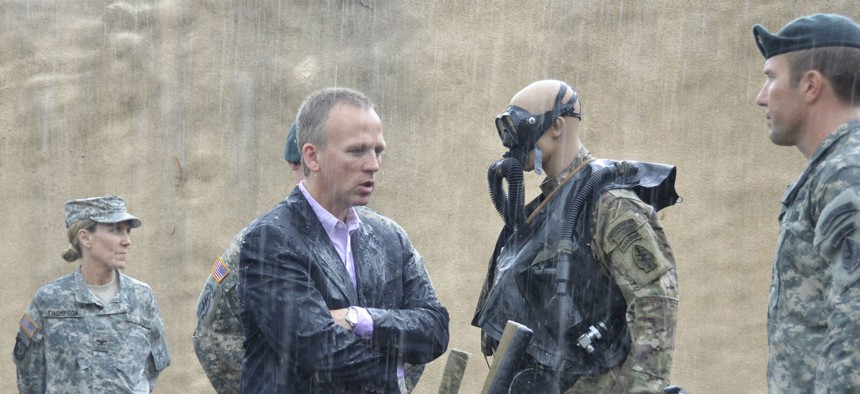
Brad Carson, then under secretary of the Army, met with troops at Fort Bragg, N.C., in 2014. Now acting undersecretary of Defense for personnel, Carson announced he would resign in April. Sgt. Daniel A. Carter, USASOC Public Affairs
Pentagon Churns Through 9 Personnel Chiefs in 7 Years, Hurting Reform
Even before Brad Carson got beat up on Capitol Hill, he was ensnared in a Catch-22.
Brad Carson went to Capitol Hill last month as President Barack Obama’s nominee for Pentagon personnel chief — and ran into a buzzsaw. Sen. John McCain blasted away at the personnel-policy reform package that Carson had crafted at the behest of Defense Secretary Ash Carter. “This initiative has been an outrageous waste of official time and resources during a period of severe fiscal constraints,” railed McCain. “It illustrates the worst aspects of a bloated and inefficient defense organization.”
The Arizona senator is known for rough treatment of witnesses; still, many observers were startled at the chairman’s apparent rancor. Were the proposed “Force of the Future” reforms really that off base? Had Carson — a former Congressman — somehow failed to do the Hill outreach that generally precedes public hearings on important executive-branch initiatives?
Certainly, some of DOD’s proposed reforms, such as covering the cost offreezing egg cells, were likely to meet resistance from a conservative-controlled Congress. Others, like the quest for better ways to measure how well the military retains its top talent, are the kind of changes that lawmakers — and the defense bureaucracy — prefer to chew over for a long time.
But Carson was also ensnared. Eleven months ago, when he was nominated as undersecretary of defense for personnel and readiness, he took the title of acting undersecretary and set to work. (Among other steps, Carson laid out his general thrust in an op-ed for Defense One.) He was still waiting for his Senate confirmation hearing in August when the rules changed: a federal court decided that a nominee for such an office cannot also serve as the “acting” official occupying the same office. (The reasoning was that the executive branch cannot have too much leeway to do things without Senate approval.) In November, McCain complained to the White House, and in response, the administration gave its nominee a new title. But McCain was soon complaining anew that Carson was still doing a job for which he was not yet confirmed. (This ruling is also why Eric Fanning, tapped last year to become Army secretary,stepped down as acting secretary in January.)
By this time, the leader of a major reform effort should have been making regular trips to Capitol Hill to talk to key staffers and lawmakers. But McCain didn’t want to hear that Carson was still the point person on personnel reforms, and Carter — with only a year left to serve in the Obama administration — was loathe to eject his hand-picked deputy from the driver’s seat. Carson got a second new title and continued his work, giving Capitol Hill a regrettably wide berth.
So when Carson went before the Armed Services Committee on Feb. 25, GOP senators came loaded for bear. McCain, for one, took aim at proposed extensions of family leave and childcare services. “I find it deeply disturbing that you are proposing to add expensive fringe benefits allegedly aimed at retention during a time when we are asking 3,000 excellent Army captains to leave the service who would have otherwise chosen to remain on active duty,” the chairman said. Meanwhile, Sen. Mike Lee, R-Utah, “criticized efforts to make the military more ‘progressive’ as off-base and unproductive,”Military Times reported.
Even after that shellacking, Carson’s decision to leave reportedly took even his staff by surprise; after the news broke on Monday, a Pentagon spokesman needed a few hours to cobble together the official statement.
Carson was considered a highly regarded pick for the job one year ago. Now, whomever Carter finds to replace him for the 10 months remaining in this administration will be the Defense Department’s tenth personnel boss since 2009.
So what’s next? Some observers pronounced sweeping personnel reform dead until such time as a new administration decides to take it up once more. But Tom Philpott, a veteran reporter who specializes in military-personnel policy, noted in a detailed March 6 report that for all the barbs thrown at Carson’s hearing, no one seemed particularly interested in blocking or rolling back reforms already put in place. “That was seen as a favorable sign as Carter prepares to announce a third and final package of initiatives for reforming the military personnel system, some of which the committee itself has been studying to modernize force management tools. Those ideas include developing more convenient on- and off-ramps to military service and modification or repeal of the up-or-out promotion system for officers,” Philpott wrote.
If he’s right, then Carson may depart having all but wrapped up the creation of his various reforms. It will fall to his successor, or successors, to implement what they can immediately and seek Congressional assent for the rest.







